- Home
- Steven Harper
Bone War Page 2
Bone War Read online
Page 2
Talfi broke off and glanced guiltily away. A woman was leaning against the palisade wall, arms crossed. Her auburn hair, caught in a long braid, contrasted sharply with her faintly greenish complexion and golden eyes. The muscles of a warrior coiled beneath her riding leathers and heavy boots, though her only visible weapon was a small knife sheathed at her belt.
“Kalessa,” Ranadar said. “Are we done for the day?”
“I would say you were just beginning.” She nodded at the other archers who were handing their borrowed arrows back to the old man who ran the range and unstringing their bows, all while pretending to ignore the two young men—regi men—who were carrying on beneath their noses. “It is near dark, and the range wishes to close. Shall we?”
“Sure, sure.” Talfi unstrung his own bow, not bothering to hide the easy skill this time. Ranadar gave him a sour look. “It’s your own fault, you know.”
“My … ?”
“By now you should know I have all sorts of hidden skills.”
“Good.”
“Good?”
“It will make paying you back all the more interesting.”
“We need to leave,” Kalessa said. “Now.” With that, she turned her back and strode stiffly toward the wooden gate. Talfi and Ranadar blinked after her.
“What did you do?” Ranadar gathered up his and Talfi’s bows and hurried after her.
“Me?” Talfi said. “Why does it have to be me?”
“It is always you.”
“It doesn’t take much to piss off an orc,” Talfi muttered as they exited. “It might have been that too many stars came out. Or too few. Or—”
“Shh! She will hear.”
They emerged from the palisade at the edge of the market square of Balsia, the largest city on the South Sea. “Market square” was something of a misnomer, since the market actually started at a square but extended down dozens of blocks and side streets like a squirming octopus. Despite—or because of—the setting sun, more and more people were moving into the market. Talfi loved the market at this time of day. Thousands of voices rose in a colorful quilt of shouts and haggles and cries as people bought and sold everything from fish to flowers, from silver to saffron, from sugar to shovels. Anything he could think of, and many things he couldn’t, came up for sale here, and something astonishing was always tugging at the corner of his eye. And lately it had just gotten better. Stalls that only two years ago had closed themselves up after dark now set out torches or lanterns and kept on selling while right beside them stalls that were shuttered for the day opened for business.
The difference was the Stane.
More than a thousand years ago, the Stane—dwarfs, trolls, and giants—had ruled the world with mostly benevolent intent. They had forged strong bonds with the Kin—orcs, humans, and merfolk—and they had brushed away the Fae—fairies, elves, and sprites. But over time, the Stane had grown corrupt in their power, stealing magic from the Kin and manipulating the Fae. Eventually, the downtrodden Fae had taken up arms against the Stane, and both sides called down terrible magics that sundered the continent itself and killed countless thousands. The Stane were banished to Glumenhame under the Iron Mountains, and the kindly Fae worked hard to restore the world. Folk said that Ashkame, the Great Tree of Life, had tipped, turned upside down, so that the Stane were at the bottom and the Fae were at the top, with the Kin always in the middle.
But in time, the Fae had also become corrupt, and the downtrodden Stane had risen up against them. Once again, their battle had nearly destroyed the world, but Talfi and his friends had put a stop to it. Barely. The Fae were pushed back into their own kingdom, and the Stane were released from their underground prison, once again able to walk in open air. But only at night—sunlight caused the Stane enormous pain.
That had happened not even three years ago. Until then, the city-state of Balsia had been a human country. But after the Stane emerged from under the mountain, Balsia’s ruler, the young Prince Karsten, had started letting trolls and dwarfs into Balsia. At first they had been useful workers with strong backs, but the dwarfs were cunning craftsmen and many trolls were skilled merchants, and they had quickly woven themselves into the fabric of Balsian society.
But because of the sunlight pain, the incoming Stane did their work indoors or underground. Or at night.
Twilight at the market square was before the humans closed up and after the Stane opened, and it fascinated Talfi no end. Who would ever have thought Kin and Stane would work side by side? Short, twisted dwarfs with beards down to their knees sold intricately carved toys that sang and dolls that danced, silver teapots that kept water hot, and even full-fledged golems of stone and clay alongside human woolmongers, weavers, and apothecaries. Nine-foot-tall trolls with jutting lower jaws, swarthy skin, and night black hair trudged barefoot across the cobblestones with great baskets on their shoulders, their rumbling voices mingling with the higher-pitched ones of human men and women who also browsed the stalls, buying, gossiping, and arguing at the tops of their lungs in the lengthening shadows and flickering torches.
Not all humans were satisfied with the new arrangement. Even as Talfi watched, some merchants closed up their stalls or packed up their pushcarts in a tight-faced huff and left when the trolls and dwarfs opened for business. More than one gave Ranadar a wide berth as well until he remembered himself and pulled up the hood on his scarlet cloak to hide his pointed ears and cast his exotic features into shadow. Elves weren’t well liked in Balsia, either—an elf’s lingering touch was addictive, and turned humans into happy, willing slaves. Talfi was grateful to the Nine that he was immune to this effect. It would have cast his entire relationship with Ranadar into doubt.
“Where’s Kalessa got to?” he asked over the noise. “She shouldn’t be too far ahead of us.”
Ranadar wore the tight look that often came over his face at the market—a great many merchants sold objects made with iron, and iron was as bad for the Fae as sunlight for the Stane.
“I do not see—there.” He pointed. Kalessa was staring at them from a nearby butcher’s stall, arms crossed. They threaded their way through the crowd to her.
“She still looks unhappy,” Ranadar observed. “We need to defuse her before she explodes.”
“We could just point her at someone we don’t like,” Talfi said.
“Are you shopping?” Kalessa said tartly. “Stopping to admire the view? Collect your favors?”
Talfi blinked at her. “We were looking for you, actually. We wouldn’t have looked so hard if we’d known our heads would get bitten off.”
“You can bite my—”
“Kalessa,” Ranadar interrupted, “even orcs are not usually so snappish with their friends. And you look unhappy. Has something happened?”
Kalessa scowled. “I am not snappish. You are both sensitive.”
Talfi caught the look in Ranadar’s eye and snagged a wooden cup from a passing alewife, who had a tray of them around her neck. He dropped a half knuckle on the tray, and the alewife filled the cup from an ale pitcher, then waited patiently so she could get her cup back.
“Have a drink,” Talfi said. “You look like you need one.”
Kalessa looked annoyed but accepted the cup and drank. She was far from home herself. The prairies of Xaron, the orc lands, lay east, on the other side of Alfhame, and Talfi knew the city put her on edge, but her quick temper was rarely directed at her friends.
“What happened?” Talfi asked.
“I do not wish to discuss it.” Kalessa held out the cup, and Talfi dropped another coin so the woman would fill it.
“As you like,” said Ranadar. “We would not understand anyway.”
“Yeah,” Talfi chimed in. “We’re just a couple of guys. Men wouldn’t understand woman problems. You should probably talk to Aisa or something.”
“Woman problems?” Kalessa drained the cup and held it out for a third, which Talfi also paid for. “Psh. My woman problems are ten times more diffic
ult than your manliest man problems.”
“I doubt it,” Ranadar goaded, his tone overly airy. “Men and women cannot understand one another’s problems. Women’s problems are just too … too …”
“You were going to say petty,” Kalessa said, thumping the cup on the alewife’s tray.
“I was not.”
“You were.” Kalessa wiped her mouth with the back of one hand. “Understand this, then. I just heard from my mother. Word of my deeds before the Battle of the Twist and of the Great Golem reached the clans, and as a result, my clan has been promoted from Sixth Nest to Third Nest.”
“Congratulations!” Talfi said in surprise. “Kalessa, that’s great news!”
“It is and it is not.” She waved away the alewife, who wandered off with her cups and pitcher. “It brings a lot of status and power to my parents, and it means my brothers and I do not have to worry so much about trying to marry up to a higher-ranking Nest.”
“So why is it bad?” Ranadar asked.
“My mother is suddenly receiving a number of marriage proposals for me,” Kalessa growled. “For the sake of the line, I must respond, and soon.”
“You do?” Talfi shook his head. “But you have a lot of older brothers, yeah? There’s no pressure on you.”
“What do my brothers have to do with it?” she asked, genuinely confused. “I’m the only female in my family’s generation. If I don’t have children, our chieftain’s line will end.”
“Oh.”
“Ah.” Ranadar nodded. “That I can understand. I am the only child, and that puts me under considerable pressure as well.”
“Uh … your parents … ,” Talfi began, then stopped himself. The subject of Ranadar’s parents was a touchy one, a subject Talfi had decided to avoid until Ranadar brought it up. Now that he had done so, Talfi found himself unsure what to say, especially since Kalessa was there.
Kalessa solved the problem for him with orcish directness. “Your parents put pressure on you?” she snorted. “How? You live in exile. The elf king is dead, and the elf queen has all but said you can never go home, now that you’ve sided with the people who killed your father. And you’re regi anyway. How many children can you sire?”
Ranadar’s face remained impassive, but Talfi bit the inside of his cheek. He knew Ranadar well, and noticed the tightening of the tendons at his neck and the way he drew his fingers along the hem of his cloak.
“Regardless of what you and my mother may think of me,” Ranadar said quietly, “I am still a prince. Actually, I am the prince. If I have no children, the royal family line will end and another family will take the throne. The throne does not care about my mother’s feelings toward me, or mine toward her. One day, she will die, and the throne will be mine to take or not. And if I do, I must have children. Therefore, she wants me to marry a nice elven woman and produce a number of nice elven children.”
“Huh.” Kalessa drew her knife and cleaned under a fingernail with it. “Bites Vik’s balls, doesn’t it?”
Ranadar remained silent for a split second, then gave a firework laugh. “It does. So maybe an orcish warrior princess who cannot decide on a man can share a problem with a regi elven prince who has already found one.”
Talfi cocked his head, trying to work this out, then gave it up. “Maybe we should stop the love party and—”
A woman’s scream tore across the market, followed by a crash. Glass shattered. All three of them came alert. The knife in Kalessa’s hand flickered and changed into a long, thin sword. Two stalls over, humans and trolls scattered, though they didn’t run away. The woman screamed again. Kalessa shouldered her way through the people with Talfi and Ranadar right behind her. In an empty half circle around a bottle maker’s stall was a figure in a ragged cloak. He faced the stall with his hood down, but his back was to Talfi, so all Talfi could see was that he had dark brown hair, badly cut. One of the bottle maker’s tables had tipped over, sending shattered glass in all directions. The plump woman who had screamed was cowering against one side of the bottler’s stall, a large market basket clutched under her arm, while the bottler stared at the man with a startled expression.
“Hideous!” said someone.
“Is it a shape-shifter?”
“Probably a half-blood.”
“Disgusting!”
“Someone call the guard!”
“What happened?” Talfi asked no one in particular.
“That creature scared this poor woman,” replied a man, turning to look at Talfi. “It’s not fit to walk the—hey! You’re—”
But Talfi was elbowing his way through the crowd into the open circle. Glass crunched under his shoes. Ranadar and Kalessa came with him. The bottler and the woman still hadn’t moved, and neither had the man. Or creature. Or whatever it was. The crowd kept its distance.
“It’s all right, friend,” Talfi said, approaching. “No one’s going to hurt you. Everyone just got a little startled is all.”
The man didn’t move. Talfi, no stranger to odd occurrences, approached with calm caution. Hey, he had faced down ghostly draugr, wyrms, trollwives, and even Death herself. What could this guy possibly do?
As he stepped forward, Ranadar said, “Talfi, perhaps we should—”
At that, the figure turned. As one, the crowd backed up a step with a gasp. A cold wave of shock washed over Talfi and he froze on the cobblestones. Every nerve jangled and he felt his bowels loosen like water. This couldn’t be. The left side of the man’s face was malformed. Shiny, translucent skin stretched over bone and thin muscle as if it had been melted. A single, lidless eye stared out of its round socket, and the lipless mouth showed a grim row of yellow teeth. An equally malformed, clawed hand clutched the ragged cloak at his throat. But the right side …
The right side of the man’s face looked exactly like Talfi’s.
Chapter Two
The little boat drifted lightly on the rocking waves beneath a golden sun. Danr, in his human form, leaned over the gunwale to peer into the azure depths. The ocean lay cool and clean beneath the warm wood, and his head was free of pain, an advantage of wearing his human form. So far it was shaping up to be a fine day.
A shadow moved beneath the water. It started small, then ballooned to human size as it rushed toward the boat. Danr pulled back as a mermaid broached the surface. Aisa. With a wild cry, she arched over the boat, trailing silver water behind her long dark hair. A mask of fierce blue tattoos and seed pearls covered her face, and her muscular tail gleamed like a hundred jewels in the sunlight. Her breasts were bare and her arms were wide. A grin split Danr’s face as Aisa passed over his head. She shouted again, a high, free sound, then landed in the water on the other side of the boat, drenching him in salty spray. He laughed, but there was a little desperation behind the sound. He had to enjoy every moment he could with her. Every second was more precious than a candle in a cavern, because one day, and he didn’t know exactly when, it would all end.
Aisa’s head popped out of the water with her hair floating all around her. Her mermaid skin was as dusky as Danr’s own, and her eyes were as wide and brown. The spiky blue tattoos gave her a proud expression, and they only enhanced her beauty. Aisa’s simple appearance in the water gave a little flutter to Danr’s heart. With a small laugh of her own, she reached out of the water. He took her hand, cool and wet.
“The water is beautiful and fine,” she said in her lilting western accent. “You should try it, my love.”
He shook his head. “I don’t want to get wet.”
“Really?” Her eyes danced with mischief. “Then why would you love a mermaid?”
She yanked hard and Danr went into the water with a yelp. The waves closed over his head. Salt water filled his nose and ears, and he started to splutter, but then Aisa was there. She put a hand over his mouth.
“Do not struggle,” she said, and the water carried her voice perfectly well. “I will not let you sink.”
They hung in the clear water. Her arm wa
s under his, bearing him up. It was still a strange feeling. He was used to being the big one, the strong one, but down here, Aisa was the power.
“Here we go!” she said, and sped away with him.
Water rushed past him, so fast, so incredibly fast. The rushing sensation made his heart leap with a thrilling mixture of fear and excitement. They burst into a school of fish that scattered in a panicked rainbow of flashing scales and wide eyes. The warm ocean flowed over him like a silken lover, delicious and soft, and just when his lungs started to ache, Aisa pulled him to the surface. They both burst high into the air and fell back with a great splash. Danr resurfaced, flinging his dark hair out his eyes and blowing water like a dolphin. Aisa circled around him, lithe and agile, and his entire body thrilled with her very presence. He rolled over onto his back and floated, something he could only do when he was fully human. Danr was a half-blood, with a human mother and troll father. His normal shape was therefore big and muscular and dense, and any attempt at floating sent him straight to the bottom. Just last year, however, he had learned how to change his shape and become fully human when he chose. His human form was much smaller, with a whipcord build, straight jaw, prominent cheekbones, and slightly paler skin than his more trollish self. His hair, however, remained thick and black and shaggy above large brown eyes.
Sunlight didn’t bother his human form, and he was able to float effortlessly on his back to enjoy the warmth and light without spears of pain drilling into his skull. Really, this was a delightful way to spend an afternoon, especially because none of it would have happened without Aisa, and it was the best way to spend their dwindling time together.
Aisa slid up beside him and murmured in his ear, “There, now. Is this not better than hiding in a boat?”
“I would never want to hide from you,” he said.
“You are hiding something I want,” she countered.
In response, he turned his head and kissed her, indeed, he did, and tasted salt on her lips while the waves rocked them both. At long last, she was here, with him. It was a perfect moment, and nothing should have ended it.

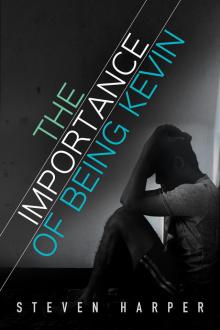 The Importance of Being Kevin
The Importance of Being Kevin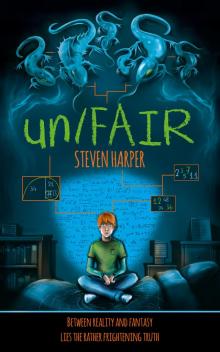 un/FAIR
un/FAIR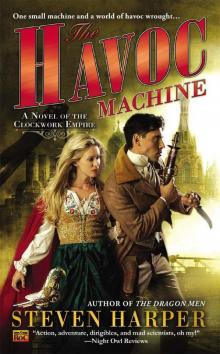 The Havoc Machine
The Havoc Machine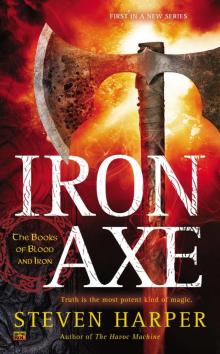 Iron Axe
Iron Axe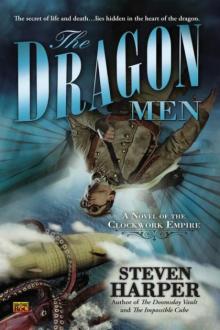 The Dragon Men
The Dragon Men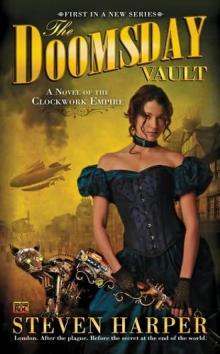 The Doomsday Vault ce-1
The Doomsday Vault ce-1 The Doomsday Vault
The Doomsday Vault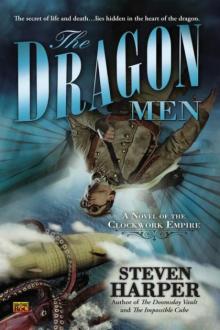 The Dragon Men ce-3
The Dragon Men ce-3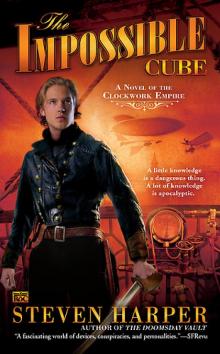 The Impossible Cube
The Impossible Cube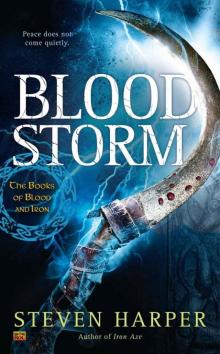 Blood Storm: The Books of Blood and Iron
Blood Storm: The Books of Blood and Iron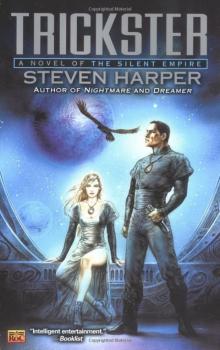 Trickster se-3
Trickster se-3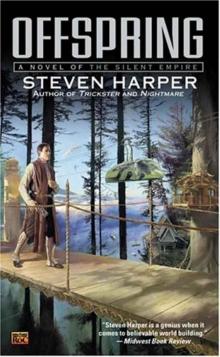 Offspring
Offspring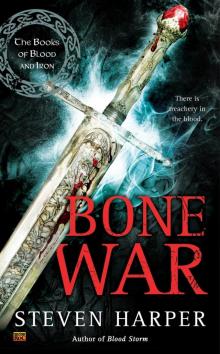 Bone War
Bone War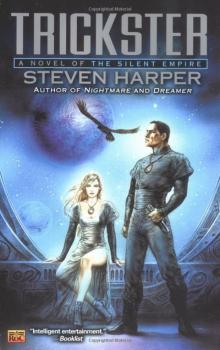 Trickster
Trickster Unity
Unity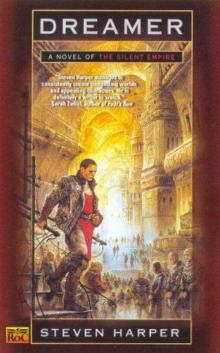 Dreamer
Dreamer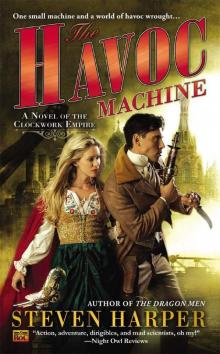 The Havoc Machine ce-4
The Havoc Machine ce-4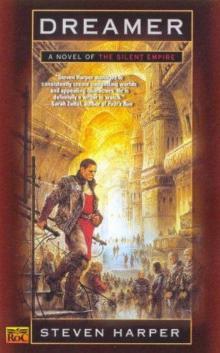 Dreamer se-2
Dreamer se-2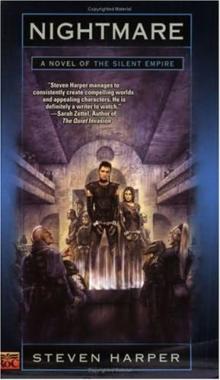 Nightmare se-2
Nightmare se-2